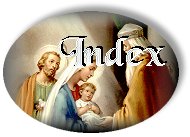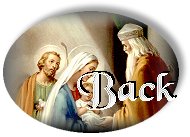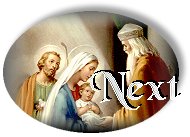I
THOSE INVOLVED IN
THE FORMATION
OF PERMANENT DEACONS
1. The Church
and the Bishop
-
18. The formation of deacons, like that of other ministers
and all the baptized, is a duty which involves the whole Church. Hailed
by the Apostle Paul as "the heavenly Jerusalem" and like Mary "our mother"
(Gal 4:26), "by preaching and baptism she brings forth sons, who are conceived
of the Holy Spirit and born of God, to a new and immortal life".(24) And
not only this: imitating the motherhood of Mary, she accompanies her children
with maternal love and cares for them so that they all may come to the
fullness of their vocation.
The Church's care for her children is expressed in
the offering of the Word and sacraments, in love and solidarity, in prayer
and in the solicitude of the various ministries. However, in this care,
which is, so to speak, visible, the care of the Holy Spirit is made present.
In fact "the social structure of the Church serves the Spirit of Christ
who vivifies it, in the building up of the body",(25) both in its universality
and in the singularity of its members.
In the Church's care for her children, the first figure,
therefore, is the Spirit of Christ. It is He who calls them, accompanies
them and moulds their hearts so that they can recognize his grace and respond
generously to it. The Church must be well aware of this sacramental relevance
of its educational work.
-
19. In the formation of permanent deacons, the first sign
and instrument of the Spirit of Christ is the proper Bishop (or the competent
Major Superior).(26) He is the one ultimately responsible for their discernment
and formation.(27) While ordinarily exercising this duty through the assistants
who have been chosen, nevertheless he will he commit himself, as far as
is possible, to knowing personally those who are preparing for diaconate.
2. Those
responsible for formation
-
20. Those persons who, in dependence upon the Bishop (or
competent Major Superior) and in strict collaboration with the diaconal
community, have a special responsibility in the formation of candidates
for the permanent diaconate are: the director of formation, the tutor (where
the number requires it), the spiritual director and the pastor (or the
minister to whom the candidate is entrusted for the diaconal placement).
-
21. The director of formation, nominated by the Bishop
(or the competent Major Superior) has the task of co-ordinating the different
people involved in the formation, of supervising and inspiring the whole
work of education in its various dimensions, and of maintaining contacts
with the families of married aspirants and candidates and with their communities
of origin. In addition, he has the responsibility of presenting to the
Bishop (or to the competent Major Superior) the judgement of suitability
on aspirants for their admission among the candidates, and on candidates
for their promotion to the order of diaconate after having heard the opinion
of the other formators,(28) excepting the spiritual director.
Because of his decisive and delicate duties, the director
of formation must be chosen with great care. He must be a man of lively
faith and a strong ecclesial sense, have had a wide pastoral experience
and have given proof of wisdom, balance and capacity for communion; in
addition he must have acquired a solid theological and pedagogical competence.
He could be a priest or a deacon and, preferably,
not be at the same time also responsible for ordained deacons. In fact,
it would be better for this responsibility to remain distinct from that
of forming aspirants and candidates.
-
22. The tutor, designated by the director of formation
from among the deacons or priests of proven experience and nominated by
the Bishop (or the competent Major Superior), is the direct companion of
each aspirant and of each candidate. He is charged with closely following
the formation of each one, offering his support and advice for the resolution
of any problems which may arise and for helping to make personal the various
moments of formation. He is also called to collaborate with the director
of formation in the programming of the different formational activities
and in the preparation of the judgement of suitability to be presented
to the Bishop (or the competent Major Superior). According to circumstances,
the tutor will be responsible for only one person or for a small group.
-
23. The spiritual director is chosen by each aspirant
or candidate and must be approved by the Bishop or Major Superior. His
task is that of discerning the workings of the Spirit in the soul of those
called and, at the same time, of accompanying and supporting their ongoing
conversion; he must also give concrete suggestions to help bring about
an authentic diaconal spirituality and offer effective incentives for acquiring
the associated virtues. Because of all this, aspirants and candidates are
invited to entrust themselves for spiritual direction only to priests of
proven virtue, equipped with a good theological culture, of profound spiritual
experience, of marked pedagogical sense, of strong and refined ministerial
sensibility.
-
24. The pastor (or other minister) is chosen by the director
of formation in agreement with the other members of the formation team
and taking account of the different situations of the candidates. He is
called to offer to the one who has been entrusted to him a lively ministerial
communion and to introduce him to and accompany him in those pastoral activities
which he considers most suitable; he will also be careful to make a periodic
check on the work done with the candidate himself and to communicate the
progress of the placement to the director of formation.
3. Professors
-
25. The professors contribute in a relevant way to the
formation of the future deacons. In fact by teaching the sacrum depositum
held by the Church, they nourish the faith of the candidates and qualify
them to be teachers of the People of God. For that reason they must occupy
themselves not only with acquiring the necessary scientific competence
and an adequate pedagogical ability, but also with witnessing with their
lives to the Truth which they teach.
In order to harmonize their specific contribution
with the other dimensions of formation, it is important that they be willing,
depending on circumstances, to collaborate and be open to discussion with
the others involved in formation. In this way they will contribute to providing
the candidates with a unified formation and help them in the necessary
work of synthesis.
4. The
formation community of permanent deacons
-
26. Aspirants and candidates for the permanent diaconate,
naturally constitute a unique context, a distinct ecclesial community which
strongly influences the formation process.
Those entrusted with the formation must take care
that this community be characterized by a profound spirituality, a sense
of belonging, a spirit of service and missionary thrust, and have a definite
rhythm of meetings and prayer.
The formation community of permanent deacons can thus
be for aspirants and candidates for the diaconate a precious support in
the discernment of their vocation, in human growth, in the initiation to
the spiritual life, in theological study and pastoral experience.
5. Communities of
origin
-
27. The communities of origin of aspirants and candidates
for the diaconate can exercise some influence on their formation.
For younger aspirants and candidates, the family can
be an extraordinary help. It must be invited to "...accompany the formative
journey with prayer, respect, the good example of the domestic virtues
and spiritual and material help, especially in difficult moments... Even
in the case of parents or relatives who are indifferent or opposed to the
choice of a vocation, a clear and calm facing of the situation and the
encouragement which derives from it can be a great help to the deeper and
more determined maturing of a...vocation". (29) As far as married aspirants
and candidates are concerned, their commitment must be such that their
married communion might contribute in a real way to inspiring their formation
journey towards the goal of the diaconate.
The parish community is called to accompany the path
of its member towards the diaconate with the support of prayer and an appropriate
catechesis which, while it makes the faithful aware of this ministry, gives
to the candidate a strong aid to his vocational discernment.
Those other ecclesial groupings from which aspirants
and candidates for the diaconate come can also continue to be for them
a source of help and support, of light and warmth. However, they must show,
at the same time, respect for the ministerial call of their members, not
obstructing them, but rather promoting in them the maturing of an authentic
diaconal spirituality and readiness.
6. Aspirant and
candidate
28. Finally, the man preparing for diaconate "...is
a necessary and irreplaceable agent in his own formation: all formation...is
ultimately a self-formation".(30)
Self-formation does not imply isolation, closure to
or independence from formators, but responsibility and dynamism in responding
with generosity to God's call, valuing to the highest the people and tools
which Providence puts at one's disposition.
Self-formation has its root in a firm determination
to grow in life according to the Spirit and in conformity with the vocation
received, and it is nourished in being humbly open to recognizing one's
own limitations and one's own gifts.




